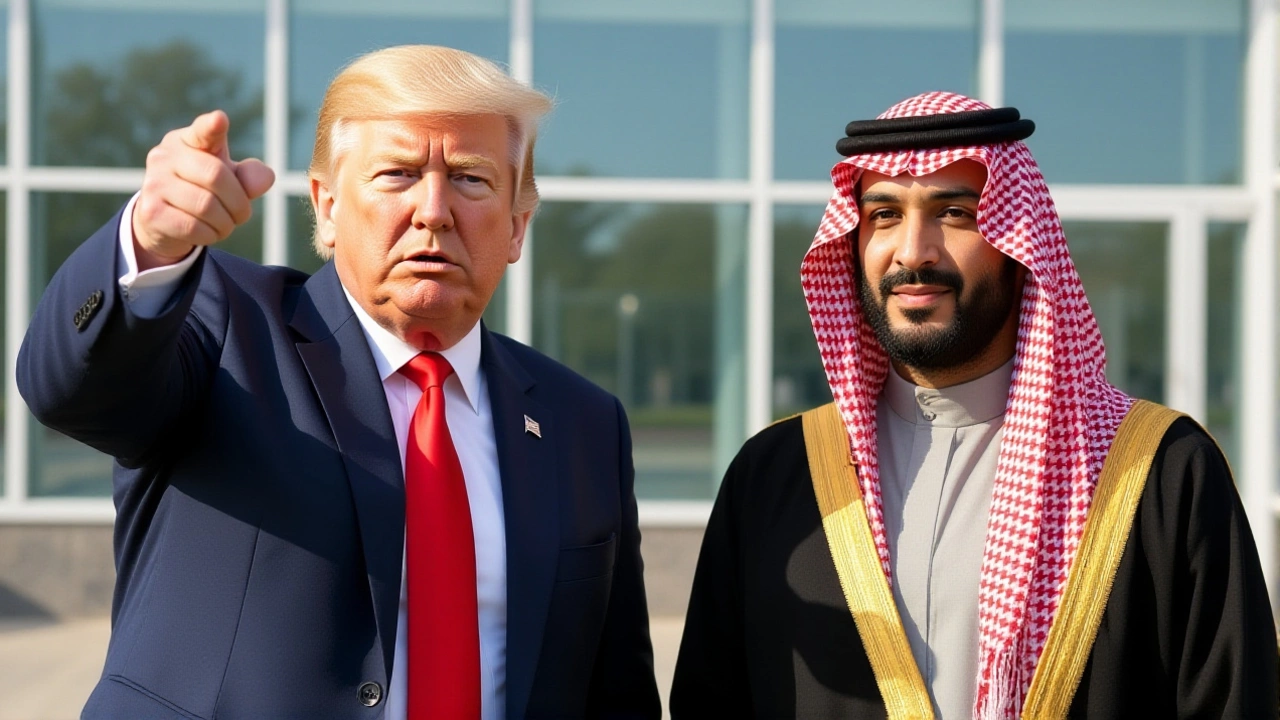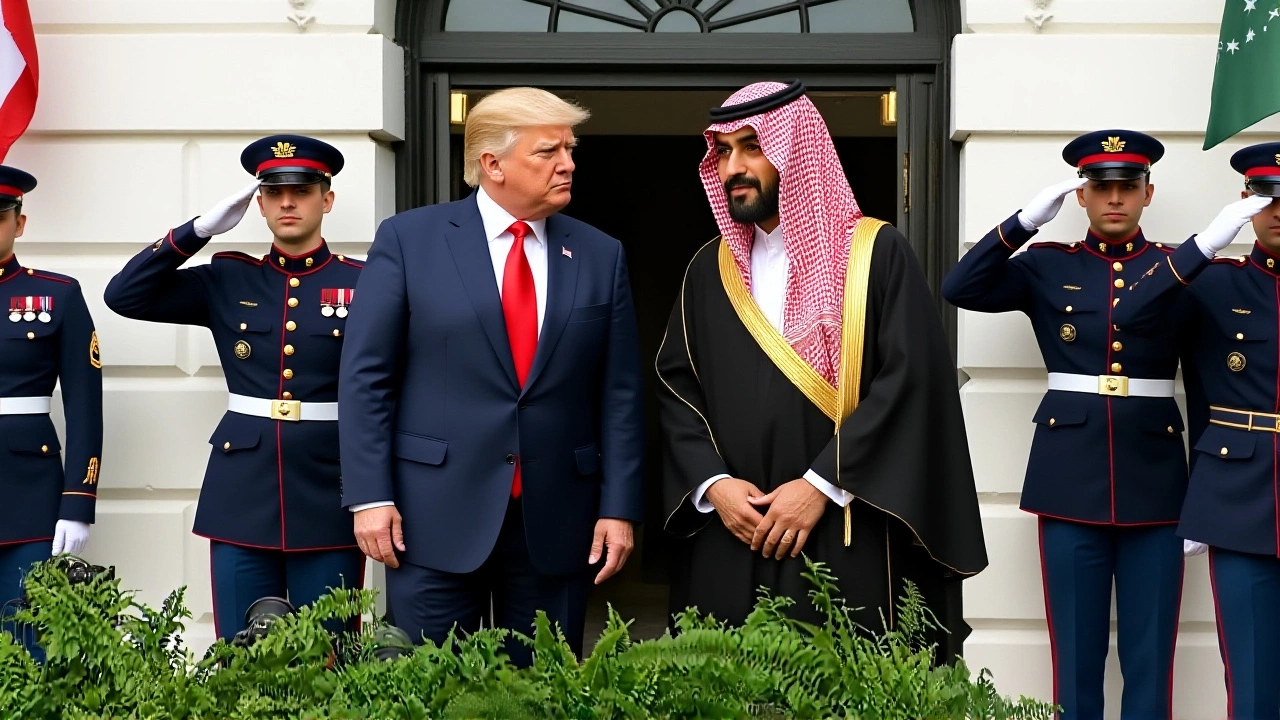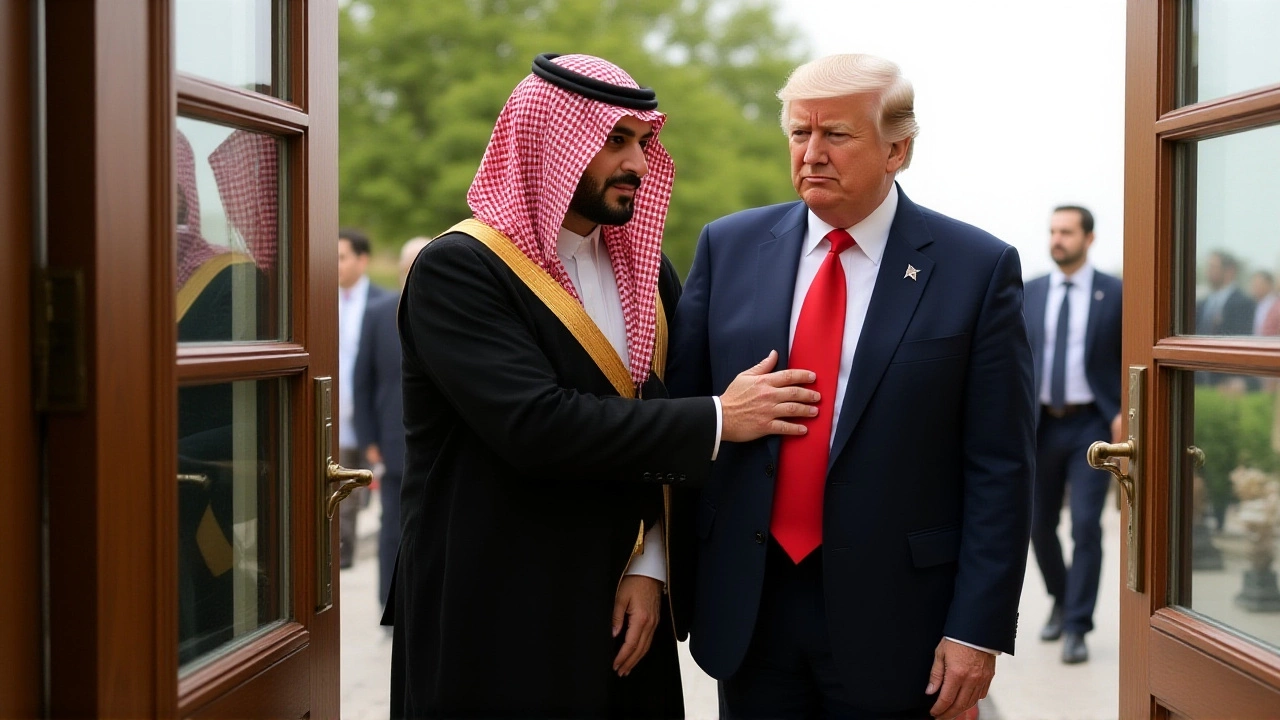On Tuesday, November 19, 2025, Donald Trump welcomed Mohammad bin Salman, Crown Prince of Saudi Arabia, to the White House for a spectacle-laden diplomatic summit that reshaped U.S.-Middle East security policy — and reignited global controversy over human rights. The meeting, which began with a flyover by U.S. Air Force F-35s and ended with a candlelit dinner in the East Room, wasn’t just theater. It was a policy earthquake: Trump announced Saudi Arabia’s new status as a major non-NATO ally, approved the sale of advanced F-35 fighter jets, and sealed a $1 trillion investment pledge from Riyadh — all while brushing off questions about the 2018 murder of journalist Jamal Khashoggi.
Symbolism Meets Strategy: The White House Ceremony
The morning unfolded like a state visit from another era. An honor guard of mounted cavalry trotted down the South Lawn. Trump and bin Salman stood side by side, watching jets streak across a crisp November sky. The optics were undeniable: a former president, back in the spotlight, treating a leader once shunned by Washington as an equal. But behind the pageantry, the substance was sharper. Trump didn’t just host a guest — he rewrote the rules of U.S. arms sales in the Middle East.The F-35 Deal: A Strategic Gamble
The centerpiece of the meeting was the formal approval of F-35 fighter jet sales to Saudi Arabia — a move Trump had teased days earlier but only finalized on November 19. The Pentagon had resisted. Officials feared the fifth-generation stealth technology could be compromised, especially given Saudi Arabia’s deepening economic ties with China. Yet Trump dismissed concerns, claiming Israel’s "qualitative military edge" would remain intact — without offering specifics. The sale, if completed, would be the most significant U.S. arms transfer to the Gulf since the 1990s. And it’s not just jets. The two nations signed a deal for 298 M1 Abrams tanks, a contract worth over $2.3 billion.A Nuclear Shadow: The Quiet Push for Civilian Nuclear Cooperation
Even more consequential was the agreement to advance a civilian nuclear cooperation pact. While framed as peaceful energy development, the move raises alarms in Israel and among nonproliferation experts. Saudi Arabia has long sought nuclear technology, and while it claims it won’t pursue weapons, the precedent is dangerous. The U.S. has historically blocked such deals with nations lacking strong nonproliferation safeguards. Trump’s willingness to move forward — without public conditions — signals a dramatic shift in U.S. foreign policy priorities.
The Trillion Question: Investment or Illusion?
Bin Salman pledged that the Public Investment Fund of Saudi Arabia would invest $1 trillion in the U.S. economy. The number stunned markets. But skepticism followed fast. Henderson, a Gulf policy specialist, called the figure "vague," noting Saudi Arabia’s budget needs oil at $100 a barrel to break even — and prices have hovered near $75. "They’re scaling back NEOM and The Line," he said. "This isn’t a spending spree — it’s a survival strategy." But E.J. Antoni, chief economist at the Heritage Foundation, offered a counterpoint: "It’s plausible — over 10, 15 years. They’ve got oil wealth, sovereign wealth, and a plan. They’re not just buying U.S. bonds. They’re looking at ports, AI, energy infrastructure." The White House offered no details on structure, timeline, or sectors. Is this a bond purchase? A venture fund? A real estate spree? No one knows. But markets are already pricing in the possibility.The Khashoggi Shadow: A Moral Calculus
The meeting was the first White House visit by bin Salman since U.S. intelligence concluded he ordered the 2018 killing of Jamal Khashoggi inside the Saudi consulate in Istanbul. Trump, then president, dismissed the findings. Now, back in power, he doubled down. "He’s a strong leader," Trump told reporters. "We’re building the future, not digging up the past." Human rights groups condemned the visit. "This is a green light to autocrats," said a spokesperson for Human Rights Watch. "It tells the world that brutality can be forgiven if the oil flows." But in Washington, the calculus is simpler: Saudi Arabia buys U.S. weapons. It helps contain Iran. It’s a partner in energy markets. Moral discomfort is secondary.
What’s Next: The Kennedy Center Summit
The next day, November 20, 2025, Trump and bin Salman co-hosted a high-profile investment summit at the John F. Kennedy Center for the Performing Arts. Business leaders from Boeing, Lockheed Martin, BlackRock, and Saudi Aramco filled the ballroom. Deals were signed. Handshakes were exchanged. But the real test begins now: Can Saudi Arabia deliver on its trillion-dollar promise? And will Congress, still skeptical of the F-35 sale and nuclear deal, block the next steps?Why This Matters
This isn’t just about jets or tanks. It’s about the future of U.S. alliances. The U.S. is trading its moral authority for strategic leverage. The major non-NATO ally status — symbolic but legally meaningful — opens the door to intelligence sharing, joint training, and preferential arms procurement. For Saudi Arabia, it’s legitimacy on the world stage. For Trump, it’s a legacy move: a foreign policy triumph built on transactional relationships, not values.Frequently Asked Questions
What does "major non-NATO ally" actually mean for Saudi Arabia?
The designation grants Saudi Arabia preferential access to U.S. military equipment, joint training programs, and streamlined defense procurement — but no mutual defense guarantee like NATO members receive. It’s a legal status under U.S. law, not a treaty. Countries like Egypt, Australia, and Qatar hold the same status. For Saudi Arabia, it signals U.S. trust — and makes it easier to buy advanced weapons like the F-35.
Why are experts skeptical about the $1 trillion investment pledge?
The Public Investment Fund’s current assets are estimated at $800 billion, and Saudi Arabia’s budget requires oil prices near $100/barrel to balance — currently, they’re around $75. The kingdom has already scaled back its $500 billion NEOM project and The Line. Analysts question whether the trillion is a long-term target stretched over decades or a misleading headline. Without specifics on timing or sectors, the pledge feels more political than economic.
Could the F-35 sale compromise U.S. military secrets?
Yes, potentially. The F-35’s stealth tech and software are among the most closely guarded U.S. secrets. While export versions have reduced capabilities, U.S. defense officials worry Saudi Arabia’s ties to China — including joint tech ventures and data-sharing agreements — could create backdoors. The Pentagon has previously blocked sales to nations with similar risks. Trump’s override suggests a new priority: revenue and influence over security.
How has Israel responded to these developments?
Israel has privately expressed alarm. While publicly cautious, officials fear the F-35 sale and nuclear cooperation could trigger a regional arms race. If Saudi Arabia gains advanced air power and nuclear infrastructure, Iran may accelerate its own program. Israel’s "qualitative military edge" — a U.S.-backed doctrine — could erode. Washington’s assurances have not eased Tel Aviv’s concerns.
Is this a sign Trump is returning to the presidency?
The White House meeting, the media spectacle, and the global attention suggest a deliberate political reset. Trump is positioning himself as the only leader who can deliver on "America First" deals — even with controversial allies. While he’s not officially running yet, this event was clearly designed to energize his base and reframe his legacy as a dealmaker, not a divisive figure.
What’s the next step for Congress on this deal?
Congress must be notified of major arms sales under the Arms Export Control Act, and lawmakers can block them with a joint resolution — though Trump could veto it. The Senate Foreign Relations Committee will likely hold hearings. Democrats and some Republicans are already signaling opposition, especially on the F-35 and nuclear deals. The real battle begins in December.
